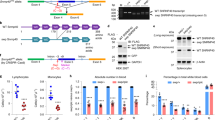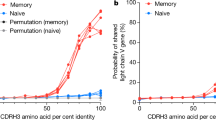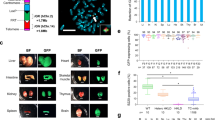Abstract
AMONG the light chains of the rabbit immunoglobulin molecules four allotypically determined molecular species can be distinguished : A4, A5, A61 and A92. These specificities are determined by allelic genes at the Ab allotypic locus1,2. Thus a rabbit homozygous at this locus synthesizes only one of these specificities, but a heterozygous rabbit synthesizes two. The phenotypic expression of the synthesizing capacity of heterozygotes can be altered by administration of anti-allotype antibody; synthesis of immunoglobulins of the paternal type can be inhibited (“suppressed”) either by uterine transfer3–7 of allotype antibody from the mothers immunized against the allotypic specificity of the prospective father8 or by injecting the young rabbits with allotype antiserum during the first few days of life9–11. When a heterozygous rabbit is exposed to anti-allotype serum the resulting suppression of one allotypic specificity is compensated by increased synthesis of the product of the second allele; thus the total concentration of IgG is not affected and is similar to that of the normal rabbits9,11.
This is a preview of subscription content, access via your institution
Access options
Subscribe to this journal
Receive 51 print issues and online access
$199.00 per year
only $3.90 per issue
Buy this article
- Purchase on Springer Link
- Instant access to full article PDF
Prices may be subject to local taxes which are calculated during checkout
Similar content being viewed by others
References
Dray, S., Dubiski, S., Kelus, A., Lennox, E. S., and Oudin, J., Nature, 195, 677 (1962).
Dubiski, S., and Muller, P. J., Nature, 214, 696 (1967).
Brambell, F. W. R., Hemmings, W. A., Henderson, M., and Parry, H. J., Proc. Roy. Soc., B, 136, 131 (1949).
Brambell, F. W. R., Hemmings, W. A., Henderson, M., and Rowlands, W. T., Proc. Roy. Soc., Ser. B, 137, 239 (1950).
Brambell, F. W. R., Hemmings, G. P., Hemmings, W. A., Henderson, M., and Rowlands, W. T., Proc. Roy. Soc., Ser, B, 138, 188 (1951).
Batty, I., Brambell, F. W. R., Hemmings, W. A., and Oakley, C. L., Proc. Roy. Soc., Ser, B, 142, 452 (1954).
Brambell, F. W. R., Hemmings, W. A., and Morris, I. G., Nature, 203, 1352 (1964).
Dray, S., Nature, 195, 677 (1962).
Mage, R., and Dray, S., J. Immunol., 95, 525 (1965).
Dubiski, S., Fradette, K., Proc. Soc. Exp. Biol. and Med., 122, 126 (1966).
Dubiski, S., in Proc. Symp. Regulation of Antibody Response, Toronto, 1966 (C. Thomas, in the press, 1967).
Oudin, J., Meth. Med. Res., 5, 335 (1952).
Dray, S., and Nisonoff, A., Proc. Soc. Exp. Biol. and Med., 113, 20 (1963).
Author information
Authors and Affiliations
Rights and permissions
About this article
Cite this article
DUBISKI, S. Suppression of Synthesis of Allotypically Defined Immunoglobulins and Compensation by another Sub-class of Immunoglobulin. Nature 214, 1365–1366 (1967). https://doi.org/10.1038/2141365a0
Received:
Issue Date:
DOI: https://doi.org/10.1038/2141365a0
This article is cited by
-
Diversity of immunoglobulin structural gene loci
Survey of Immunologic Research (1983)
Comments
By submitting a comment you agree to abide by our Terms and Community Guidelines. If you find something abusive or that does not comply with our terms or guidelines please flag it as inappropriate.



